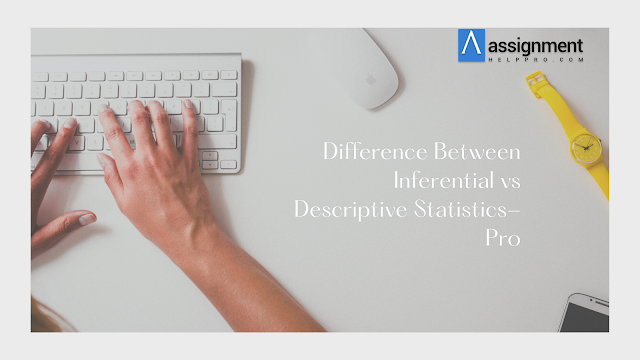Difference between inferential vs descriptive statistics-Pro
Statistics is a component subject of mathematics that allows us to use math to reach conclusions about different situations. It mainly focuses on the collection, organization, analysis, interpretation, and presentation of data. When we discussed statistical analysis, there are two concepts that hold considerable matter in this field.
In short, Descriptive statistics research and analyze big data with
the help of charts and tables. It never tries to use illustrations to arrive at
a conclusion.
Conversely, in inferential statistics, students test hypotheses.
They study the sample and come to the conclusion regarding the population.
Below we discussed the inferential and descriptive statistics to
make them understand better.
Descriptive statistics
Descriptive statistics are small constants that help to summarize
or restate the data set. This data set is the whole or a sample of a given
population. It divides into measures of central direction and measures of the
majority of variability.
Measures of central tendency define the mean and mode. It helps to
describe the central position of the frequency distribution for a given raw
data. It is better to use different measures of central tendency in different
conditions.
Mean: It is used for
serial data and is also known as the arithmetic average.
Median: It divides the
data into two equal portions. One part of the data is smaller than that
number, another part is larger. It is used for continuous or ordinal
data.
Mode: There is a large amount of data in the Mode. It is used for absolute hierarchical data.
Inferential statistics
To make a good understanding of inferential statistics, first, understand the term population in statistics. When people think that population in statistics does not mean only the human population. Instead, it means the entire raw data for analysis. There are times when people analyze data that does not fully exist. Here samples have to be used for data analysis. For example, you want to collect data on the number of cancer patients under the age of 18 in the whole world. Here you may not get the exact number of patients. Here you use sample data for a specific population. It creates the dissimilarity between descriptive vs inferential statistics.
The common differences between descriptive vs inferential
statistics
Descriptive statistics-
- Using
descriptive statistics, researchers have complete raw population data.
- Descriptive statistics are used
when sampling is not needed.
- The properties of the raw
population Mean, Median, and Mode are understood as descriptive
statistical parameters.
- There are some limitations to
this type of data. And applicable only if there is actually measured data.
- The descriptive form of the data is almost always 100 percent correct because no inferences are being made from the uncooked population data.
Inferential statistics
- Most
researchers take the help of inferential statistics when there is a large
amount of raw population data that cannot be compiled or aggregated.
- Here sampling procedure is
needed as the analysis is based on sampling parameters.
- In estimation statistics, the
properties of the sample data are pronounced not as parameters but as
statistics.
- It can be applied to a large
population of data when the sample data is representative of the
population.
- Whereas, inference figures are based on conjectures or inferences based on samples. This is the reason why 100% accuracy cannot be found in estimated data.
Conclusion -
As easy as it may seem to learn the concepts of descriptive
vs inferential statistics, it can be a challenging thing for someone to
implement in a real-world situation. Having thousands of data to analyze might
not be a lot of work, but when that data reaches hundreds or thousands, things
can get a little more complicated.
Source Url: https://innersaladbird.tumblr.com/post/682960180546355200/difference-between-inferential-vs-descriptive




Comments
Post a Comment